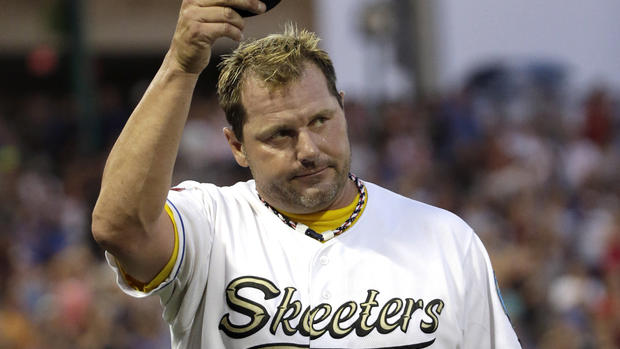Roger Clemens: Prosecutors wanted mistrial
WASHINGTON - With his trial abruptly cut short, former baseball star Roger Clemens argued Friday that prosecutors intentionally goaded him into asking for a mistrial and asked a judge to throw out his indictment on charges of lying to Congress.
Clemens argued that a new trial would violate his constitutional right against the double jeopardy of facing the same charge twice.
His lawyers said prosecutors' revelation that a teammate told his wife that Clemens confessed to using a drug "was no accident." They said the prosecutors chose to ignore U.S. District Judge Reggie Walton's order against using her testimony so they could provoke a mistrial because their case was going badly. The mistrial came on the second day of testimony in a trial that had been expected to last four to six weeks.
Judge declares mistrial in Roger Clemens case
Most legal experts who reviewed copies of the Clemens transcripts for The Associated Press say he probably will face a second trial under rules established by the Supreme Court. They said that when a mistrial is requested by the accused, the general rule is that the guarantee against double jeopardy does not prevent another trial unless the judge finds prosecutors provoked a mistrial. But the experts point out there's no indication prosecutors would have wanted to start their case over so soon.
But the Clemens team argued "this is the rare case" that meets the standard.
"By the time the government provoked the mistrial, its highly experienced counsel had suffered a series of setbacks that cast doubt on the case against Mr. Clemens," defense attorneys wrote. They pointed out that prosecutors have not said they made a mistake and argued that the violations "were critical, hotly contested pretrial issues that no experienced prosecutor could simply have missed when it came time to finalize exhibits and prepare witnesses."
Prosecutors have three weeks to respond. Walton has set a Sept. 2 hearing on the retrial issue.
Clemens' attorneys argued that the record-setting pitcher has lived in a continuing state of anxiety and insecurity over the possibility that even though innocent he may be found guilty. They argued a second trial would reward government misconduct by giving prosecutors a chance to improve jury selection, hone its trial strategy and address other issues raised early in the first trial.
"The government had its day in court and squandered it with misconduct that irretrievably wasted time, money and the opportunity for a one-time, fair resolution of these charges for all involved," Clemens' attorneys wrote in their filing.
The sudden ending to Clemens' trial came when prosecutors showed jurors a video of his 2008 testimony before Congress in which the he denied ever using performance-enhancing drugs during his 24-season career. Clemens is charged with lying under oath when he made that denial.
CBSSports.com: Roger Clemens profile and career stats
In the video, Rep. Elijah Cummings, D-Md., pointed out that Clemens' good friend and teammate, Andy Pettitte, says Clemens admitted using human growth hormone in a private conversation in 1999 or 2000. Clemens responded that Pettitte "misheard" or "misremembered" their conversation. But Cummings said Pettitte's wife, Laura, has given lawmakers an affidavit saying that her husband told her about the conversation with Clemens at the time it happened.
Walton had ruled before the trial began that Laura Pettitte's comments were inadmissible hearsay because she didn't speak to Clemens directly. When jurors began to hear about Laura Pettitte's statement, Walton quickly cut off the tape and admonished prosecutors. Clemens attorney Rusty Hardin did not object when the material appeared on the video. But after Walton stopped the presentation, Hardin at first asked the judge to tell jurors to disregard references to Laura Pettitte, but then asked for a mistrial. Walton agreed, saying he didn't know how he could "un-ring the bell" and give Clemens a fair trial with that jury.
Clemens attorneys argued it was the second time prosecutors had violated Walton's pre-trial orders. The first came, they said, during opening arguments when assistant U.S. attorney Steven Durham said Clemens' Yankee teammates would testify that they used human growth hormone. Walton told jurors to ignore the mention of the other players' drug use, since he previously told prosecutors he was concerned that it could lead jurors to conclude Clemens was guilty by association.

